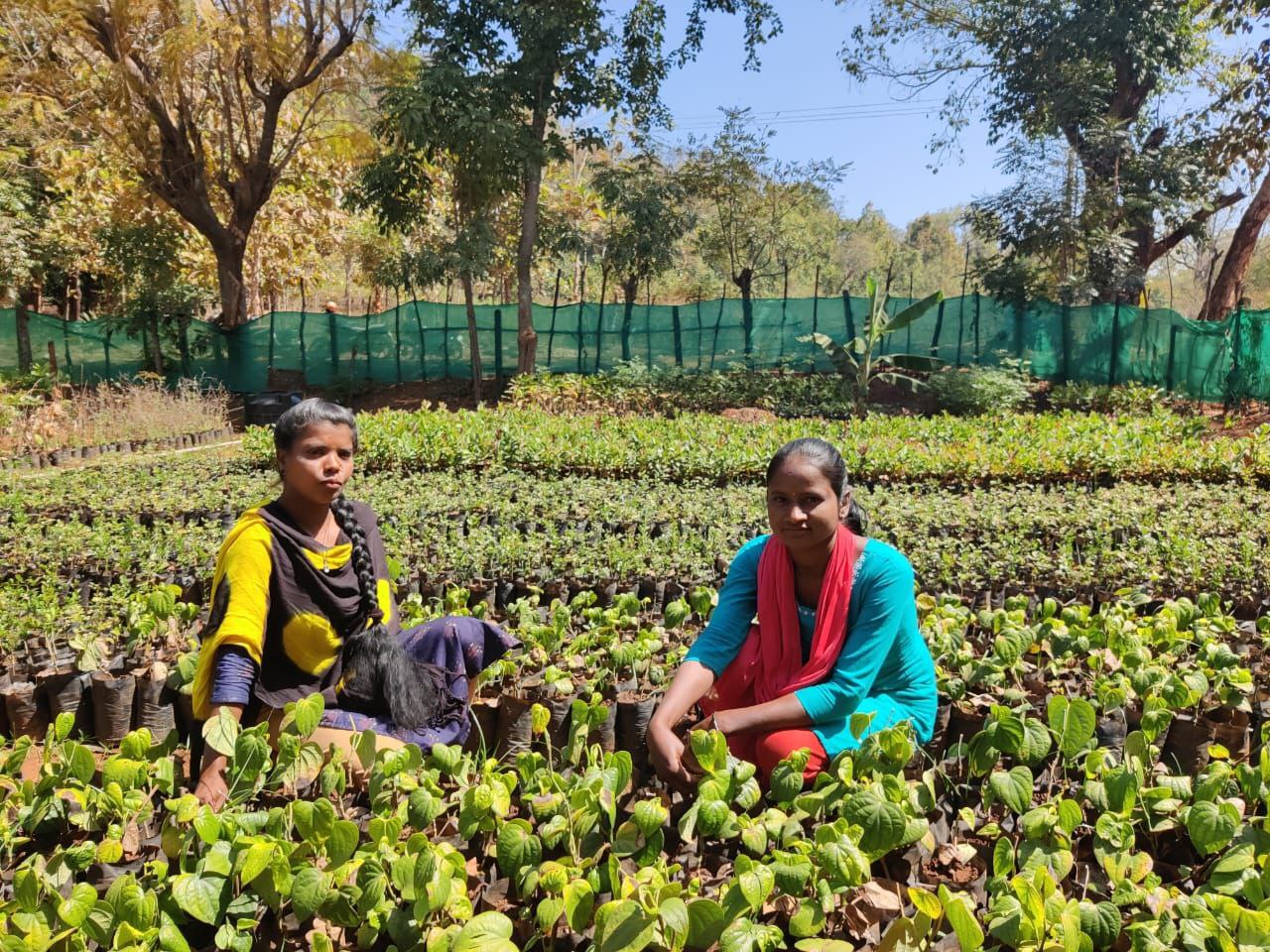Young Adivasi women become microentrepreneurs to secure land, water sources and their own future
StoryBy Chandrika Patnaik
17 May 2023
Mangel Majhi and Kalindri Majhi from Kalahandi trained and worked as Spring Stewarship Fellows with Gram Vikas to make their communities water secure while ensuring their own financial independence.

Mangel and Kalindri with their saplings in the nursey they jointly manage.
Photograph by Bidyutprava Praharaj
Mangel Majhi, 19, and Kalindri Majhi, 21, are hopeful owners of an agroforestry microenterprise in Dudukaguda village of Odisha’s Kalahandi district. The two young women from smallholder farming families in remote Adivasi habitations see this as a path to realising their aspirations for a better life.
Mangel belongs to Dhuliguda village in Thuamul Rampur block of Kalahandi district, a predominantly tribal hamlet with 90% population belonging to the Scheduled Tribe communities. Her father, Leli Majhi, happens to be the only earning member of the family, who worked in a small Dhaba, a roadside eatery in a nearby village, Kaniguma. Mangel failed in Class 12, but her parents wanted her to study but at the same time were unable to afford to pay for her education.
Kalindri belongs to Dudukaguda, a smaller village with only 194 people, where 21% are from the Scheduled Tribes. Her father struggles with alcoholism and, though landed, has sold off most of the land to service his debts. Kalindri worked as a tailor in a garment factory in Bengaluru for six months in late 2020, “I returned home after my mother fell ill. I am their only child. I wanted to find work in or around the village.”
Mangel and Kalindri met at Gram Vikas while training to be Jala Bandhu, in the Spring Stewardship Fellowship programme in the year 2021. The programme builds a cadre of young men and women from the Adivasi communities trained in hydrogeology, accounting, and technologies such as Google Earth Pro and Vertical Electric Sounding tests to become a knowledge resource pool for their communities. It promotes local skill-building and entrepreneurship while allowing the cadres earn a stipend of 8000 a month. Under the fellowship programme, the fellows monitor community level water sources including the springs, both pre and post monsoon. The data collected is used to prepare the fve-year (2020-2025) Village Groundwater Management Plan.
Mangel and Kalindri learnt and trained their communities to map groundwater, monitor springs, develop degraded land, set up nurseries, undertake social and agroforestry plantations, conserve soil and moisture, and intercrop to rejuvenate land and water sources. Together, they visited a total of 22 villages in Kaniguma Gram Panchayat to help their communities plan, execute, and manage water and land development work.
After closing of their one-year fellowship, Mangel and Kalindri started their own nursery in March 2022. Their ambitions of further education and financial independence fuelled the entrepreneurial spirit, “We had no means to earn in the village to pursue our goals. So, we decided to raise plants in a nursery, something we learned during the fellowship.” They engaged labour to prepare the soil, got manure and made the polybags ready. “My father, Leli Majhi, and Kalindri’s father, Derang Majhi, helped us set up the thatched roof for the nursery,” says Mangel. The entire process took them around 15 days. In the next two days, the girls collected over 20,000 seeds of mahalimba, chakunda, karanja, custard apple, jackfruit, tamarind, and kendu from the nearby forest and soaked the seeds in water for three days.
Mangel’s mother, Somabari, 50 and Kalindri’s mother, Panamati, 52, helped fill the polybags with the treated soil and plant a seed in each polybag. In total, they invested 25,000 in setting up the nursery. Within six months of setting up their nursery, in August 2022, they sold 19,450 saplings to Gram Vikas at the rate of ₹5.53. “Out of the 20,000 saplings, 550 did not survive. We sold the remaining 19,450 to Gram Vikas as they were doing plantation work on the hills of a village in our Gram Panchayat. We earned ₹1,07,559.”
The girls hope to make the most now that each one has earned a tidy sum. With the money she earned, Mangel decided to pursue her studies and started preparations to appear for the Class 12 exam in 2023. She desires to take up a course in nursing, “I am confdent I can make decisions and not depend on my parents for money.”
Kalindri travelled to Bangalore in September 2022 to get the Provident Fund due from the garment export company she worked in earlier. After getting her money, Kalindri returned to her village in December 2022. For three months, she stayed in Bangalore, working in the same factory stitching clothes to meet her daily expenses in the city. Back home, she has bought a sewing machine from the money she had saved while working in Bangalore and has started a tailoring shop in Bhawanipatna town, the district headquarters of Kalahandi, about 65 kilometres from her village in Dudukaguda.
Kalindri running her tailoring and grocery shop in her village.
Photograph by Bidyutprava Praharaj
ACKNOWLEDGEMENT
Bidyutprava Praharaj, Thematic Coordinator in Planning Monitoring Documentation and Communication, helped collect data for the story. Priya Pillai edited the story.
ABOUT THE AUTHOR
Chandrika Patnaik leads content production within the Communications team in Gram Vikas.
RELATED BLOGPOSTS
Talachkel village triumphs over contaminated water
Nitrate removal technology ensures safe drinking water for Odisha’s Talachkel village community.
Beyond the monsoon’s mercy: women collectives cultivate climate resilience in Odisha
Dhaogaon’s women fight climate change, secure food, and boost income through community fish farming.
Safe Water, Better Nutrition: How Poshan Mitras drive WASH practices in Odisha villages
In Odisha’s villages, Poshan Mitras enhance water quality, nutrition, and sanitation through behavioural change.